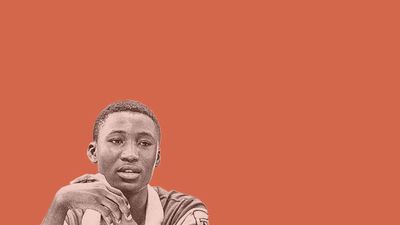Caine Prize Preview 2017: 'God’s Children Are Little Broken Things' by Arinze Ifeakandu
Arinze Ifeakandu has written a queer coming-of-age story set in Northern Nigeria at a time when draconian anti-gay laws are imperiling Nigerian LGBT communities. The result is melancholic yet potentially uplifting.
Launched in 2000, the Caine Prize for African Writing is a award for short stories written by writers of African origin and published in the English language. This year’s 166 entries from 23 countries is the highest number of submissions in its 17 year history. The five shortlisted stories for the 2017 prize are:
“Virus” by Magogodi oaMphela Makhene (South Africa)
“Who Will Greet You At Home” by Lesley Nneka Arimah (Nigeria)
“The Story of the Girl Whose Bird Flew Away” Bushra al-Fadil (Sudan)
“Bush Baby” by Chikodili Emelumadu (Nigeria)
“God’s Children Are Little Broken Things” by Arinze Ifeakandu (Nigeria)
This year’s winner will be awarded £10 000 and the other shortlisted writers will each receive £500 to be announced on July 3rd at the Senate House Library in London. OkayAfrica contributor Sabo Kpade will review each shortlisted entry leading up to the announcement of the winner on July 3rd. Entry 3 is God Children Are Little Things by Arinze Ifeakandu.
Coming of age stories are ready-fodder for fiction. Where the writer will have to succeed is in the execution, and in this Arinze Ifeakandu has excelled to a large extent.
“God’s Children Are Little Broken Things” is mainly about two young men, Lotanna and Kamsi, who are in a tertiary institution in Kano in northern Nigeria. The would-be lovers keep their mutual attraction under wraps, understandably, for fear of rejection from friends and family, and possibly violent homophobia.
Also complicating the pair’s relationship is Rachael, Lotanna’s girlfriend who is also in the dark about his sexuality and to whom Lotanna feels indebted. This triangle of potent feelings could be sufficient for many short or long stories, but Ifeakandu has also given Lotanna more problems to grapple with. Back in southeast Nigeria where his family is, his mother has suffered abuse from his father, one she may not survive, deteriorating his relationship with his father.
Ifeakandu’s narrator speaks in the third person “you met in your second year. At the stadium one cloudy evening when you played against his department”, but any dislocation this at first brings on, soon fades as the story progresses. But then progress in this story needs a little definition.
It is not by a succession of pages, 20 in total, as one reads, and not even strictly by the accretion of details—backstories, character’s thought processes—which most signal a forward momentum.
Progress, and plot resolutions, are arrived at by shifts in perspectives that instantly changes perceptions of prior events.
Rarely is there a rupture when the story’s lead charges—homosexuality, tradition, religion, domestic abuse—suggests an impending explosion. An implosion would do, but Ifeakandu hasn’t bothered much with that either.
Lotanna’s first sexual experience was always going to be crucial, perhaps more so in a Nigeria where as recently as 2014, president Goodluck Jonathan signed into law an anti-homosexuality bill with a 14-year prison sentence, all with the overwhelming support of the country’s legislative houses.
Attenuating this is the fact that these same sex laws were first introduced by the British penal code, draconian especially in the early 1900s, into it’s protectorate that became Nigeria.
The 2014 bill was just as retrogressive, repulsive and plain daft. Even dafter were the public shamings and killings of people suspected to be gay, sometimes in the presence of policemen.
Using a few deft touches, Ifeakandu renders Lotanna’s first big experience in vivid and tactile ways. Lotanna works his way around Kamsi’s body only to discover that his nipples were “two tiny hard grains” and when they kissed “he tasted almost of nothing”.
The general tenor of narration here is that of melancholy with full-on sadness a dial away.
Occasionally, Ifeakandu hits deeper notes of melancholy. Lotanna, jealous of Kent, a possible rival for Kamsi, harbours ill-feelings towards him “as you sat on the veranda, waiting for him to be done, you shocked yourself by how hard you wanted to punch Kent. It was in the days that followed that you learned the definition of the word gentleness”, and Ifeakandu goes on to give reasons why.
Where Ifeakandu stumbles is in his depiction of the northern Nigeria city of Kano. Features of the city deserving of clear details are sometimes slapdash and in one scene damn right offensive.
In one chunky paragraph on page 13, Lotanna walks through Kano streets where he hears “the sound of Hausa music” but Ifeakandu doesn’t say what exactly this is. A cursory Wikipedia entry offers quite a number of options, if a phone call to a Hausa-speaker is impossible to arrange.
In the same sentence, Lotanna is stopped by “a dirty-looking lady” who spoke “florid Hausa” and who he then “gaped” at as she asked: “you wan’ poke? You wan’ poke?”
I no wan’ fuck, you had said to her, dragged your hands away, and ran.
This is the kind of problematic writing that could easily be attributed to tribal differences—worse when racial—but the real problem might be the naivety of the budding writer who poorly handles sensitive material.
On the whole, “God’s Children Are Little Broken Things” satisfies as an exploration of male sexuality, youthful angst and the messiness of adulthood by way of infidelity, domestic and emotional abuse.
What most surprises is that despite these factors promising a downer of a story, the resultant feeling, while not quite an uplift, is one of relief for this reader. Other opinions may vary.
Sabo Kpade is a regular OkayAfrica contributor. His short story Chibok was shortlisted for the London Short Story Prize 2015. His first play, Have Mercy on Liverpool Street was longlisted for the Alfred Fagon Award. He lives in London. You can reach him at sabo.kpade@gmail.com
